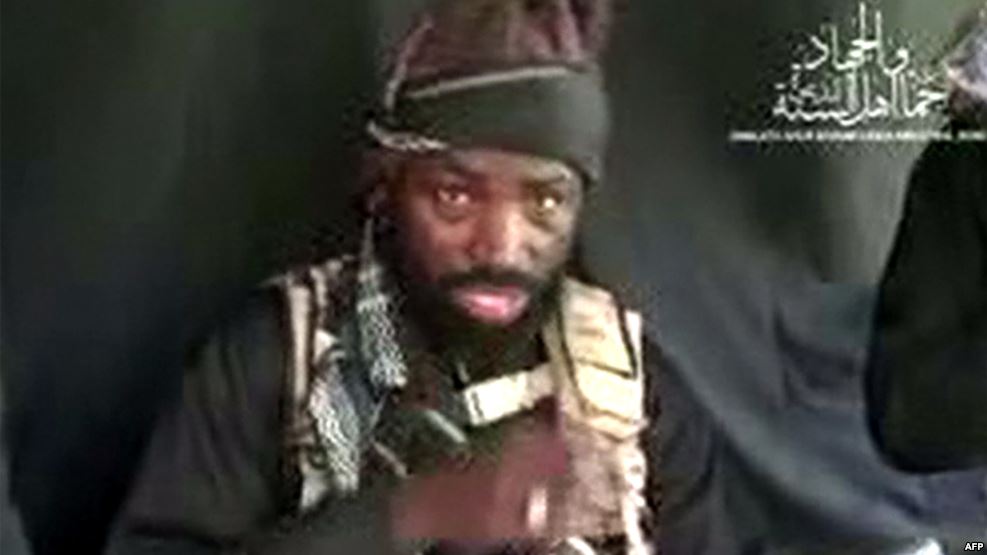
Kano (Nigeria) (AFP) – The embattled leader of jihadist group Boko Haram, Abubakar Shekau, resurfaced in a video posted online Sunday, rejecting assertions by the Nigerian army that he had been seriously wounded.
“You have been spreading in the social media that you injured or killed me,” Shekau said in the 40-minute video released on YouTube and dated September 25.
“Oh tyrants, I’m in a happy state, in good health and in safety.”
The Nigerian army said on August 23 that the longtime militant chief had been seriously wounded in the shoulder in an air raid in which several commanders were killed.
Nigerian authorities have reported him dead several times before, but the army’s latest claim was bolstered when Boko Haram — which pledged allegiance last year to the Islamic State (IS) group — released a video on September 13 without Shekau in it.
However, in the video released Sunday, Shekau points to a date on an Islamic calendar corresponding to September 25, 2016.
Speaking in Hausa, Arabic and English and in dialects spoken in northeast Nigeria he appeared to be in good physical health.
He used the video to issue threats against President Muhammadu Buhari, who appealed to the United Nations this week for help in negotiating the release of the Chibok schoolgirls kidnapped by the militants more than two years ago.
“If you want your girls, bring back our brethren,” Shekau says.
– Power struggle –
Boko Haram, which has killed at least 20,000 people since 2009 in its quest for a hardline Islamist state in northeast Nigeria, has been in the grip of a power struggle since late last year.
Last month, IS high command said Shekau had been replaced as leader by Abu Musab al-Barnawi, the 22-year-old son of Boko Haram’s founder Mohammed Yusuf.
But Shekau has maintained he is still in charge.
The first signs of a rift appeared after Shekau pledged allegiance to IS in March 2015 and changed Boko Haram’s name to Islamic State West Africa Province (ISWAP).
Clashes have since been reported between rival Boko Haram factions in Nigeria’s northeastern Borno State, near Lake Chad.
Barnawi, once a protege of Shekau, has criticised his former mentor for his indiscriminate killing of civilians — most of them fellow Muslims.
He had also criticised the brutal leadership style of Shekau, alleging he has secretly killed top militant commanders who disagreed with him.
But many experts say he is not a spent force.
“He has more fighters than either al-Barnawi or Nur, especially from the Kanuri ethnic group around Lake Chad,” said Jacob Zenn from the Jameston Foundation and an expert on the conflict.
But Zenn said many of Shekau’s backers in the IS were now dead and the embattled leader “may therefore have few supporters in IS ranks to argue for his reinstatement over al-Barnawi.”
“Shekau is therefore most likely to remain independent in the near future, which could mean that there will be no limits to a more indiscriminate killing campaign,” Zenn said.
“This could garner Shekau greater attention as compensation for on-the-ground losses and resource deficiencies.”
Security analysts have said the split could indicate a shift in focus by the pro-Barnawi faction away from targeting crowded marketplaces and mosques to hitting military and government targets.
Along with the tens of thousands killed, Boko Haram has also made more than 2.8 million people homeless, fleeing attacks on villages by ransacking militants in a conflict that has spilled over Nigeria’s borders into Niger, Chad and Cameroon.
But it was the mass kidnapping of 276 schoolgirls from the northeastern town of Chibok in July 2015 that brought unprecedented attention to Boko Haram, sparking a global campaign to “Bring Back Our Girls”.
Nigerian soldiers, with the support of regional troops, have recaptured swathes of territory lost to the jihadists since they launched a military campaign in February 2014.
Oil-rich Nigeria is facing security threats on multiple fronts: Boko Haram in the northeast, ethnic violence in the central region, Biafran separatists in the southeast and militants attacking oil infrastructure in the south.
